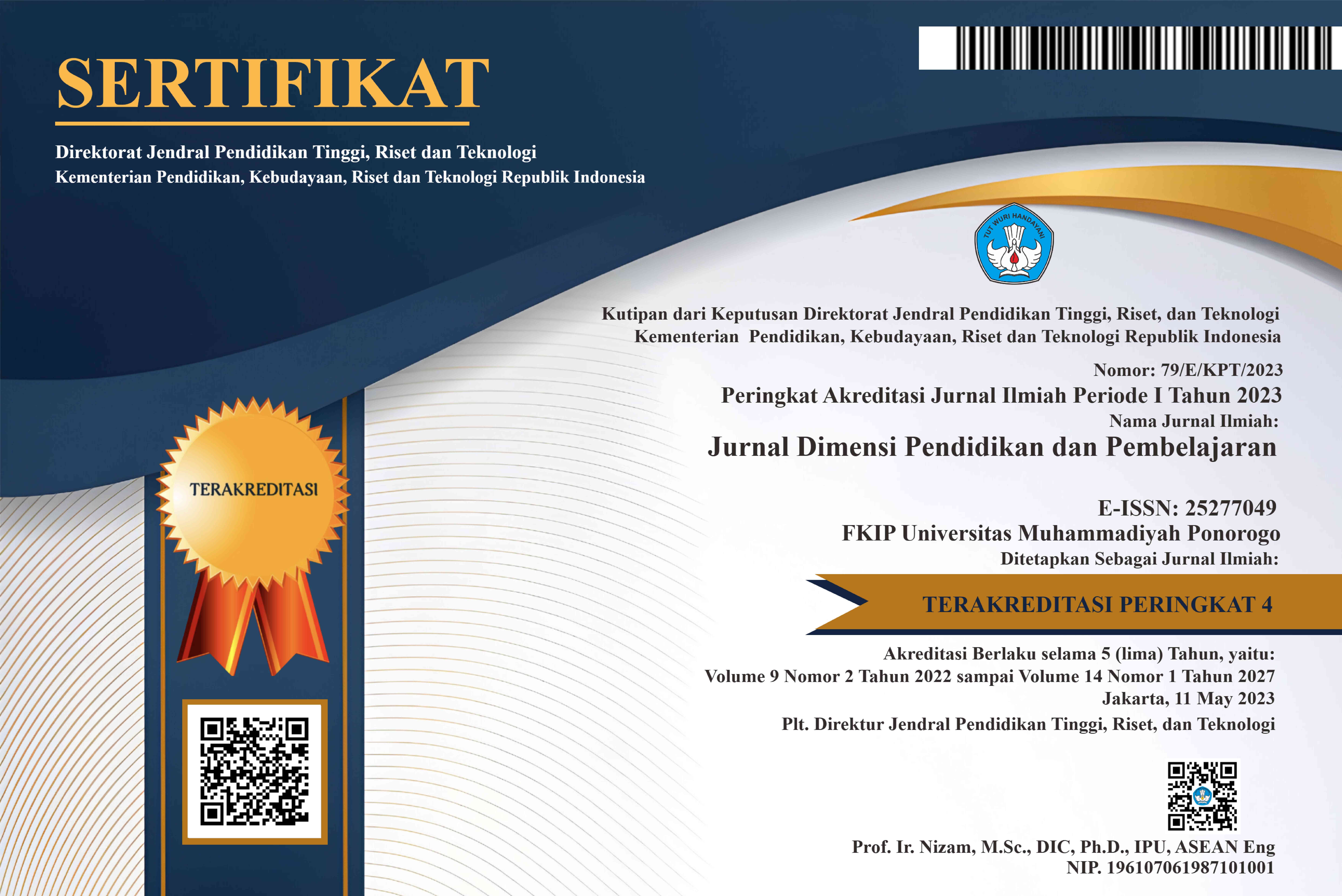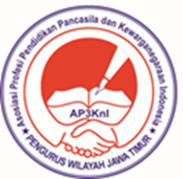The Language of The Novel Rantau 1 Muara by Ahmad Fuadi Studies Stylistics and its Relevance as Teaching Material in High School
DOI:
https://doi.org/10.24269/dpp.v11i1.6028Abstract
This article analyses the language style contained in Ahmad Fuadi's Novel Rantau 1 Muara and the relevance of language style to high school learning. In the novel, there are four types of language styles, namely comparative language styles consisting of metaphors, personifications, pleonasm, antitheses, and parables. . The style of the Looping language consists of assonance and metaphor. Linking language style consisting of synecdoche, illusion, euphemisms, and asyndeton. Based on the results of the study, it can be concluded that Ahmad Fuadi's novel Rantau 1 Muara uses a comparative language style, affirmation, and some benefits and lessons can be taken by readers and have language style implications in the world of education, especially as teaching material and language learning in high schools. The research method used to examine the major used in Ahmad Fuadi's novel Rantau Muara is a qualitative descriptive method. The object of this study is the constructive structure and style of language used in Ahmad Fuadi's novel Rantau Muara. This study's data collection techniques used library, listening, and note-taking techniques. The validity of the data in this study uses theoretical triangulation techniques. The data analysis technique in this study uses the semiotic model reading method. Meanwhile, the analysis of stylistic studies in this study was carried out by reading. Re-understanding the data obtained, then grouping the texts in Ahmad Fuadi's novel Rantau Muara per the aspects studied
References
___________. 2012. Kajian Stilistika, Perspektif Kritik Holistik. Surakarta: UNS Press.
Aminuddin. 2013. Pengantar Apresiasi Karya Sastra. Bandung: Sinar Baru Algensindo.
Endraswara, Suwardi. 2011. Metodologi Penelitian Sastra. Jakarta: Buku Seru.
Eneste, Pamusuk. 2001. Buku Pintar Sastra Indonesia. Jakarta: Kompas.
Fananie, Zaenuddi. 2002. Telaah Sastra. Surakarta: Muhammadiyah University Press.
Iskandarwassid dan Dadang Sunendar. 2013. Strategi Pembelajaran Bahasa. Bandung: Remaja Rosdakarya.
Jabrohim, dkk. 2009. Cara Menulis Kreatif. Yogyakarta: Pustaka Pelajar.
Keraf, Gorys. 2010. Diksi dan Gaya Bahasa. Jakarta: Gramedia Pustaka Utama.
Moleong, Lexy J. 2010. Metodologi Penelitian Kualitatif. Bandung : PT Remaja Rosda Karya.
Nugrahani, Farida. 2010. Metode Penelitian Kualitatif dalam Bidang Pendidikan Bahasa. Surakarta:Cakra Books
Nurhayati. 2012. Pengantar Ringkas Teori Sastra. Surakarta: Media Perkasa.
Nurgiyantoro, Burhan. 2015. Teori Pengkajian Fiksi Cetakan ke IX. Yogyakarta: Gadjah Mada. University Press.
Pradopo, Rachmad Djoko. 2010. Pengkajian Puisi. Jogjakarta: Universiti Press.
Prastowo, Andi,. 2015. Panduan Kreatif Membuat Bahan Ajar Inovatif. Yogyakarta: Diva Press.
Rahmanto, B. 2004. Metode Pengajaran Sastra. Yogyakarta: Kanisius
Rahardi, Kujana. 2005. Pragmatik: Kesantunan Imperatif Bahasa Indonesia. Jakarta : Erlangga.
Ratna, Nyoman Kutha. 2011. Teori, Metode, dan Teknik Penelitian Sastra. Yogyakarta: Pustaka Pelajar.
Sangidu. 2004. Metode Penelitian Sastra, Pendekatan Teori, Metode dan Kiat. Yogyakarta: UGM.
Satoto, Soediro. 1995. Stilistika. Surakarta: STSI Press.
Sayuti, Suminto, 2018. Berkenalan dengan Prosa Fiksi. Depok: Cantrik Pustaka.
Stanton, Robert. 2007. Teori Fiksi. Yogyakarta: Pustaka Pelajar.
Sufanti, Main. 2014. Strategi Pengajaran Bahasa dan Sastra Indonesia. Surakarta: Yuma Pustaka.
Sugiyono. 2007. Metode Penelitian Kuantitatif Kualitatif dan R&D. Bandung: Alfabeta.
Sumardjo, Jakob. 2007. Menulis Cerpen. Bandung: Pustaka Pelajar.
Sutopo, H.B. 2006. Pengantar Penelitian Kualitatif. Surakarta : Universitas. Sebelas Maret Press.
Sutresna, Ida Bagus. 2006. Prosa Fiksi. Undiksa Singaraja.
Tarigan, Henry Guntur. 2011. Prinsip-prinsip Dasar Sastra. Bandung: Angkasa
Andri Wicaksono, M. 2014. Pengkajian Prosa Fiksi (Edisi Revisi). Yogyakarta: Grundhawaca.
Zulfahnur, Z.F.dkk. 2002. Teori Sastra. Jakarta: Departemen Pendidikan dan Kebudayaan.
Downloads
Published
Issue
Section
License
Copyright
Authors who publish their manuscripts in this journal agree to the following terms:
- The copyright on each article belongs to the author.
- The author acknowledges that Jurnal Dimensi Pendidikan dan Pembelajaran has the right to be the first to publish under a Creative Commons Attribution 4.0 International (Attribution 4.0 International CC BY 4.0) license.
- Authors may submit articles separately, arranging for the non-exclusive distribution of manuscripts that have been published in this journal to other versions (e.g., sent to the author's institutional repository, publication into books, etc.), acknowledging that the manuscript was first published in the Jurnal Dimensi Pendidikan dan Pembelajaran.
Â
License
Use of the article will be governed by the Creative Commons Attribution license as currently published under the Creative Commons Attribution 4.0 International License (Attribution 4.0 International (CC BY 4.0).
Â
This license permits anyone to copy and redistribute this material in any form or format, compose, modify, and make derivatives of this material for any purpose, including commercial purposes, as long as they give credit to the author for the original work.



_001.jpg)



